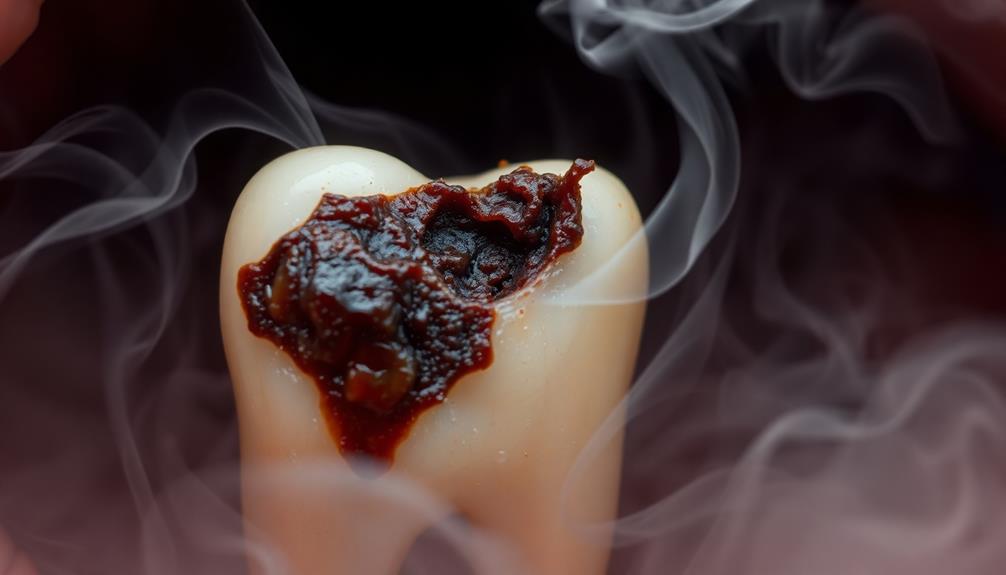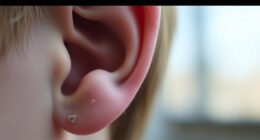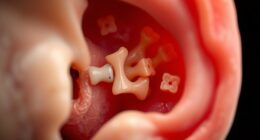Tooth decay smells pretty unpleasant, a bit like something sour or rotten. This smell comes from bacteria munching on food particles stuck in cavities. As teeth decay, the odor gets stronger and can even signal serious dental troubles, like infections. When you catch a whiff of that smell, it often means it's time to pay attention to your dental hygiene. Regular brushing, flossing, and visiting the dentist can keep your breath fresh and your smile bright. So, if you're curious about keeping those odors at bay, there's plenty more to discover about caring for your teeth!
Key Takeaways
- Tooth decay emits a pungent, sulphurous odor indicating the presence of bacteria breaking down tooth structure.
- The smell intensifies as decay progresses, often signaling advanced dental issues or infections.
- Trapped food particles in cavities exacerbate the foul odor, even with good oral hygiene.
- Persistent bad breath is a primary indicator of tooth decay and potential underlying health problems.
- Regular dental check-ups are essential for managing and preventing unpleasant odors associated with tooth decay.
Introduction

Tooth decay isn't just a dental issue; it often comes with an unpleasant smell that can be hard to ignore. You might notice bad breath that seems to linger, even after brushing your teeth. This bad breath can be one of the first signs of decay.
When bacteria break down the enamel and dentine in your teeth, they create a foul odor. Plus, decaying food particles trapped in cavities can make the smell even worse!
As tooth decay progresses, the odor can become stronger, signaling more serious problems like deeper infections or abscesses. It's important to pay attention to these signs of decay because they can impact your oral health.
If you notice a persistent bad smell, it's a good idea to check in with your dentist. Regular dental hygiene is key to keeping your mouth fresh and healthy.
Description of the Smell

When you encounter the smell of tooth decay, it's often a pungent, sulphurous odor that can be quite off-putting. This bad smell is usually a sign of trouble. As bacteria break down the enamel and dentine in your teeth, they release gases that create an unpleasant scent. If you've ever noticed a rotten tooth, you know exactly what I mean!
The odor can worsen as tooth decay progresses. You might notice a stronger, more offensive smell, which could signal advanced decay or even an infection. Food particles trapped in decayed teeth also contribute to this yucky smell. When these bits of food decompose, they become a feast for bacteria, making the odor even worse.
A persistent bad smell from your mouth is often one of the first signs of tooth decay. If you catch yourself or someone else experiencing this, it's a good idea to see a dentist. They can help identify the issue and suggest treatments.
Source and Composition

The source of the smell associated with tooth decay primarily comes from the bacteria that thrive in the decaying tooth structure.
These tiny germs love to munch on leftover food particles, especially in areas where you mightn't brush well. As they break down the enamel and dentin of your teeth, they produce gases that create a foul smell. This odor can be quite unpleasant, and it often gets stronger as cavities develop.
When food gets trapped in these cavities, it only adds to the stinky situation. Even if you're practicing good oral hygiene by brushing and flossing, bad breath can still linger. That's because the bacteria continue to thrive in the decayed areas, making it tricky to completely eliminate the smell.
As tooth decay advances, the odor can indicate more serious issues, including potential infection.
It's essential to pay attention to this smell, as it can be a sign that you need to visit the dentist. So remember, keeping up with your oral hygiene can help keep those bacteria at bay and your breath fresh!
Typical Scenarios or Environments

Neglecting oral hygiene can lead to some unpleasant scenarios, especially in social settings. Imagine chatting with friends, and suddenly you notice a rotten smell. That's often the result of tooth decay! When you don't brush or floss regularly, food particles can get trapped in your teeth, leading to bad breath. It's not just embarrassing; it can make others uncomfortable too.
In close quarters, like during lunch or group activities, the smell of decaying teeth can become really noticeable. You might find yourself avoiding conversations or feeling shy about eating in front of others. That's why regular dental check-ups are so important! They help catch any problems before they turn serious.
If you have untreated cavities, the bacteria in your mouth break down enamel and dentine, producing those foul-smelling gases. Keeping your mouth clean not only helps you avoid the rotten smell but also keeps your breath fresh.
You'll feel more confident in social situations, and your friends will appreciate it too! So, remember to brush, floss, and visit the dentist regularly. A healthy mouth equals a happy you!
Emotional or Cultural Associations

Embarrassment often accompanies the unpleasant smell of tooth decay, impacting how you feel in social situations. You might worry about bad breath, which can make you shy or self-conscious. This feeling isn't just personal; many cultures tie tooth decay to poor hygiene, creating a stigma around it. In some places, having bad breath or decayed teeth can mean you haven't cared for your oral health, leading to feelings of guilt or shame.
Picture this: a group of friends laughing together, and suddenly, someone notices an unpleasant odor. That moment can be tough! The smell of tooth decay can remind you of painful dentist visits, making you even more hesitant to seek help.
Plus, many cultures emphasize the importance of a bright smile and fresh breath, so you might feel pressure to meet those standards. These cultural associations can influence how you act. To fit in and avoid negative judgments, you might take extra care of your teeth and breath.
Health or Safety Considerations

When you notice a foul odor from your mouth, it's often a sign that something's wrong with your dental health. This bad breath might mean you have tooth decay. When bacteria break down your teeth, they release smelly gases that can make your breath less than pleasant.
It's not just about the odor; this can also signal advanced decay and possible infections in your mouth. Poor oral hygiene practices, like neglecting to floss, can exacerbate these issues, leading to a buildup of plaque and bacteria. Additionally, the risks of infections from unsterilized tools can arise if you attempt any DIY dental treatments.
Ignoring these signs can lead to bigger problems! If you notice a strong, unpleasant smell, it's a good idea to get it checked out. This could be a clue that you need professional dental care.
Regular dental check-ups are super important for keeping your oral health in check. They can help catch issues early, so you don't have to worry about severe decay or infections later.
Taking care of your teeth is essential for your overall dental health. Brushing, flossing, and visiting your dentist regularly are fun ways to keep your smile bright and fresh!
Final Thoughts

Taking care of your dental health is crucial for maintaining a pleasant smile and fresh breath. When you have tooth decay, it can lead to rotten teeth and even worse, bad breath!
That's because bacteria break down your tooth enamel and dentin, releasing stinky gases that create unpleasant odors. If you notice a strange smell coming from your mouth, it might be a sign of underlying dental issues, like untreated cavities or gum disease. Additionally, poor oral hygiene practices can exacerbate these problems, allowing harmful bacteria to thrive and worsen the odors. Regular dental check-ups are essential for diagnosing and treating these conditions before they lead to more serious complications. Just like in dental health, body smells can sometimes indicate underlying issues, as seen in *different earwax smells explained*, where variations in odor can help identify potential ear infections or excessive bacterial growth.
Regular dental check-ups are super important to catch tooth decay early. By visiting your dentist, you can keep your oral health in tip-top shape.
They'll help you spot problems before they turn into bigger issues. Plus, it's a great way to ensure your breath stays fresh and your smile stays bright!
Frequently Asked Questions
Does a Rotting Tooth Smell?
Yes, a rotting tooth definitely smells. You might notice a foul, sulphurous odor, similar to rotten eggs, as bacteria break down the tooth. This unpleasant smell indicates a serious issue that requires immediate dental attention.
What Does a Tooth Infection Smell Like?
A tooth infection smells foul and sulfurous, often described as rotten or decaying. You might notice this unpleasant odor even after brushing, signaling a serious issue that needs immediate dental attention to prevent complications.
Why Do Some People Smell Like Tooth Decay?
If you notice someone smelling like tooth decay, it could be due to untreated cavities or poor oral hygiene. Bacteria break down food particles, releasing foul odors that linger, affecting their breath and overall scent.
How Can You Tell if Your Tooth Is Decaying?
You can tell if your tooth's decaying by watching for brown spots, increased sensitivity, or persistent bad breath. If you notice these signs, it's time to schedule a dental check-up to address potential issues.









